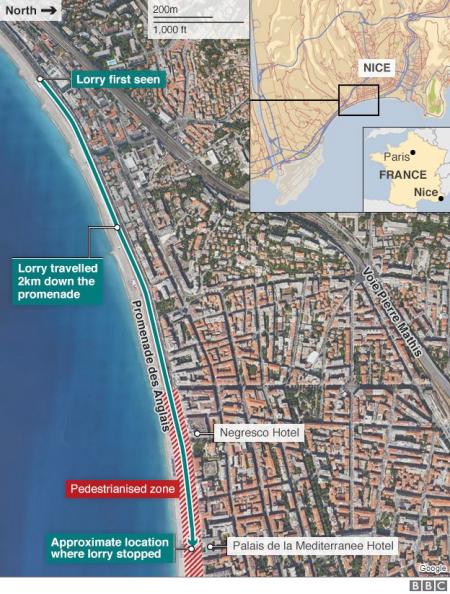by BBC
Fifty people injured in the Bastille Day attack in Nice are in a critical condition "between life and death", President Francois Hollande has said.
At least 84 people died, including more than 10 children, after a lorry crushed them along 2km (1.2 miles) of the Promenade des Anglais on Thursday.
The driver, named by sources as French-Tunisian Mohamed Lahouaiej-Bouhlel, 31, was shot dead by police.
Guns and a grenade found inside the lorry were reported to be fakes.
President Hollande, who is in Nice, said the attack was of "an undeniable terrorist nature".
He said the battle against terrorism would be long as France faced an enemy "that will continue to attack those people and those countries that count liberty as an essential value".
Mr Hollande said the attack was carried out "to satisfy the cruelty of an individual or possibly a group" and that many of the victims were foreigners and young children.
"We will overcome the suffering because we are a united France," he said.
A state of emergency, in place since November's Paris attacks carried out by militants from the so-called Islamic State group, in which 130 people died, has been extended by three months.
The attack in Nice began shortly after the end of a firework display on the seafront.
What witnesses saw
Simon Coates, a solicitor from Leeds told the BBC: "I saw one woman lying on the ground talking to her dead child, as other people desperately did what they could to save their loved ones.
"As the lorry passed by me a young boy of 10 or so just managed to leap to one side and escape by inches. Tragically dozens of those on foot, young and old alike, were not so lucky.
Virtually everyone I saw on the promenade was either dead or beyond real help with truly terrible injuries."
Nader el-Shafei told the BBC he saw the driver face-to-face for about a minute: "He was very nervous… looking for something around him, I kept yelling at him and waving my hands to stop... he picked up his gun and started to shoot police."
Afterwards he said he ran towards the beach with others, fearing the driver, who was then shot by police, would detonate the lorry.
Who were the victims?
Some 30,000 people were on the Promenade des Anglais at the time of the attack, officials said.
Tourists and residents of Nice were among those who died. They included two American citizens - a father and his 11-year-old son - a Ukrainian, a Russian and a Swiss woman.
The son of Fatima Charrihi said she was the first to die. He said she "practised Islam in the proper way. A real Islam, not the terrorists' version".
Fondation Lenval, the children's hospital in Nice, says it has treated some 50 children and adolescents, including two who died during or after surgery.
The president announced only on Tuesday that France planned to end its state of emergency soon. It will now be extended for another three months.
That means police and soldiers on the streets, guarding key buildings. It means scanners and metal arches at some shops and regular bag searches. Gendarme reserves have been called up in support. There are already tighter checks at France's borders.
Security services have denied they relaxed after the Euro 2016 football tournament and there has been praise for the relentless job they have done in recent months and for the speed of their reaction last night in Nice.
Intelligence gathering has improved but predicting and preventing every attack is impossible. Some are questioning whether even a state of emergency is an effective level of response. The French are being warned they are going to have to live with terrorism.
That means some big questions about the nature of "liberte" - one of the founding principles of this nation that people celebrated on Bastille Day.
No group has so far said it was behind the attack.
The identity papers of the 31-year-old French-Tunisian were found in the lorry, which was reportedly rented out two days earlier in the suburb of Saint-Laurent-du-Var.
Tunisian security sources said Bouhlel was married with three children and came from the Tunisian town of Msaken. He visited Tunisia frequently, the last time eight months ago.
He lived on the Route de Turin in Nice and had been in trouble with police in the past for petty crime, but he was not on the watch list of radicalised young men.
Residents of his apartment building said he was a loner who did not respond when they said hello.
To read the full piece from BBC News Magazine, click here.


